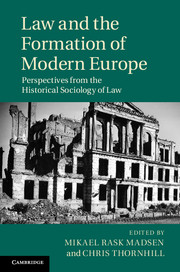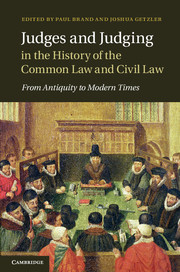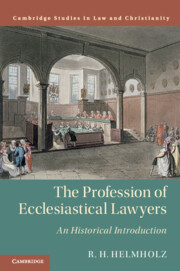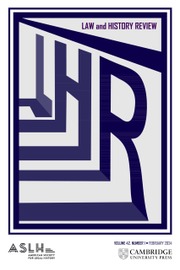Law and the Formation of Modern Europe
Law and the Formation of Modern Europe explores processes of legal construction in both the national and supranational domains, and it provides an overview of the modern European legal order. In its supranational focus, it examines the sociological pressures which have given rise to European public law, the national origins of key transnational legal institutions and the elite motivations driving the formation of European law. In its national focus, it addresses legal questions and problems which have assumed importance in parallel fashion in different national societies, and which have shaped European law more indirectly. Examples of this are the post-1914 transformation of classical private law, the rise of corporatism, the legal response to the post-1945 legacy of authoritarianism, the emergence of human rights law and the growth of judicial review. This two-level sociological approach to European law results in unique insights into the dynamics of national and supranational legal formation.
- Uses distinctive historical-sociological methods to examine the foundations of European law and legal integration
- Analysis of both the national and the supranational origins of European law provides an encompassing account of the factors shaping its formation
- Cross-section of sociological approaches to main features of European law serves as an introduction to different patterns of legal sociological inquiry in the context of modern European law
Product details
August 2014Hardback
9781107044050
378 pages
235 × 158 × 22 mm
0.64kg
Available
Table of Contents
- 1. Introduction: law and the formation of modern Europe: perspectives from the historical sociology of law Mikael Rask Madsen and Chris Thornhill
- Part I. Legal Institutions and European State Formation:
- 2. Fascism and European state formation: the crisis of constituent power Chris Thornhill
- 3. The beginnings of constitutional justice in Europe Thomas Olechowski
- 4. Judicialization in sociohistorical perspective – lessons from the case of France Antoine Vauchez
- 5. Towards a sociology of intermediary institutions: the role of law in corporatism, neo-corporatism and governance Poul Kjaer
- Part II. Law and Europe's Ideological Transformations:
- 6. Private, public and collective: the twentieth century in Italy from fascism to democracy Irene Stolzi
- 7. Nazism and its legal aftermath: coming to terms with the past after World War II Ditlev Tamm
- 8. Between socialism and liberalism: law, emancipation and 'solidarność' Jacek Kurczewski
- Part III. Law and the Supranational Reinvention of Europe:
- 9. Europe in crisis – an evolutionary genealogy Hauke Brunkhorst
- 10. International human rights and the transformation of European society: from 'free Europe' to Europe of human rights Mikael Rask Madsen
- 11. Lawyers and the transformations of the fields of state power: osmosis, hysteresis and aggiornamento Yves Dezalay and Bryant Garth.







